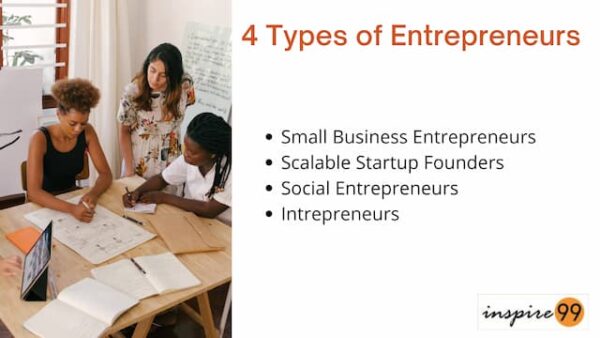Types of entrepreneurs: Entrepreneurs come in all shapes and sizes. In this article, we talk about the 4 types of entrepreneurs and the differences between them. The underlying definition for all entrepreneurs is the ability to take risks. Depending on the types of risks, and potential outcomes, we can define the type of entrepreneur and their business. The main reason to separate these types of entrepreneurs is that it helps you attract the right type if investors, accelerators etc.

4 Types of Entrepreneurs
An entrepreneur is someone who takes risks. This risk is mostly in the form of starting a business or company. This business can either be a large or small one. The size of risk doesn’t define the type of entrepreneur – instead, the field in which you operate can help you classify entrepreneurship. The 4 types of entrepreneurs are Small Business Entrepreneurs, Scalable Startup Founders, Social Entrepreneurs and Intrapreneurs.
Small Business Entrepreneurs
Small business entrepreneurs have fewer employees and generally offer existing products or services. This is the main difference between small business entrepreneur and a startup entrepreneurs. Most small businesses focus on existing customers and expanding their reach. The amount of innovation in such types of businesses is lower. However, small business entrepreneurs have a faster time to market, existing network which makes it feasible to focus on growth and expansion quickly.
Scalable Startup Entrepreneurship
Startups are fun – they are characterised by huge growth potential and massive risks. Most times when people say entrepreneurs, they refer to scalable startup entrepreneurship. These businesses are supported by business plans, incubators, startup funding and other activities. They have a huge market potential and can provide massive returns. Perhaps this is the main reason investors are interested due to their overwhelming potential for growth and expansion.
Right from the start, scalable startup entrepreneurship is about creating value. They have a pattern of heavy early investment, slow breakeven and phenomenal growth to follow. This type of business has large risks and potential for failure. But the payouts can be remarkably high.
Social Entrepreneurs
I have a personal liking for social entrepreneurship. These types of businesses have a social impact at the heart of their business plan. Sure, profits are important. However, it is not the primary motive for these types of entrepreneurs. The drive is to create a lasting impact. Some examples include climate change, alleviating poverty, education, etc. They follow the same route as that of a normal business plan. However, this type of entrepreneurship is different from an NGO or a charity where the focus is less on growth and more on sustenance. Social entrepreneurship does borrow the growing philosophy from a startup but with the social impact at its centre
Ref: https://en.wikipedia.org/wiki/Social_entrepreneurship
Intrapreneurs
This is probably the safest type of entrepreneurship. Intrapreneur is about creating a company while you’re in employment. As an intraprenuer, you have the backing of your company to help you create value. However, you will not have complete ownership of the business as you’d in a standard entrepreneurship model. But, you will be able to use the company’s resources such as brand, customer exposure etc to expand quickly. If you have the right idea, scaling up and reaching wider customer base will be easier in this type of entrepreneurship. You can find a detailed listing of difference between intrapreneur and entrepreneur for in depth information.
References:
https://en.wikipedia.org/wiki/Intrapreneurship
https://www.investopedia.com/articles/personal-finance/040915/how-many-startups-fail-and-why.asp

Pingback: What is a Small business entrepreneurship? - Inspire99
Pingback: What is a startup- 4 differences with small business - Inspire99
Pingback: Four Types of Entrepreneurship for a Founder - Inspire99
Pingback: The word Entrepreneur is derived from Entreprende - Meaning - Inspire99
Pingback: What is the meaning of entrepreneur, functions and characteristics - Inspire 99